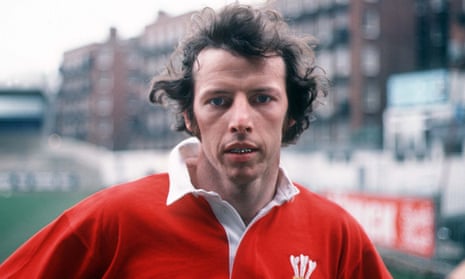Wales will wear black armbands when they play Scotland at Parc y Scarlets on Saturday as a mark of respect to their Lions wing JJ Williams, who has died at the age of 72. The match will be held on the 48th anniversary of Llanelli’s 9-3 victory against New Zealand in which he appeared.
It was his first season with the club after joining from Bridgend, a town close to his birth place, Nantyffyllon. A sprinter who represented Wales in the 1970 Commonwealth Games, Williams believed he would achieve more success as a rugby player than on the track but – despite scoring 99 tries in 100 appearances for Bridgend at a time when the club topped the unofficial Welsh championship – he had to move to Llanelli to realise his ambition of playing for Wales.
By the end of his first season with Llanelli, who were then coached by Carwyn James, he had won his first cap, as a replacement in Paris. He started the next 29 Tests, scoring 12 tries, including a hat-trick against Australia in 1975, before retiring from international rugby at the end of the decade at the age of 30 to start his own business.
He went on two Lions tours, to South Africa in 1974 and New Zealand three years later. He scored five tries in seven Tests for the Lions, one behind the record holder, Ireland’s Tony O’Reilly, and against the Springboks he scored two tries in two Tests, the first Lions player to do so.
They were the second and third Tests, which the Lions won to secure the series. Cheering them on was a group of political prisoners on Robben Island who included Nelson Mandela, who saw the tourists’ success as a defeat for the government and its policy of apartheid.
“I was supposed to have been one of Nelson Mandela’s favourite players,” Williams wrote in his autobiography. “You cannot ask for a bigger compliment than that. One of my most treasured photographs is one of me sprinting round behind the Springboks posts [in Port Elizabeth] to touch the ball down. Not because it is me but because of the reaction of the black people in the crowd. The sheer joy on their faces, the arms raised in a victory salute at another Lions try is something I still marvel at.”
As a schoolboy, Williams became the sprint champion of Great Britain and pace was his greatest asset as a rugby player. He pioneered the chip-and-chase where the combination of his own speed and an opponent having to turn and slow down yielded a harvest of tries, but his opportunism was married to an ability to read a game.
He was part of two grand slam-winning Wales sides, in 1976 and 1978, and in 1979 signed off with a triple crown after scoring a try against England in his final international. He scored 163 tries in 227 matches for Llanelli and in his entire first-class career scored 352 tries in 438 appearances.
After he retired from club rugby at the end of 1980, he became a straight-talking pundit, as direct off the field as he was on it. When Wales turned the National Stadium into the Millennium Stadium at the end of the 1990s, he led a campaign to have a room inside it devoted to former Test players having founded the charity WREX, the Welsh Former International Players Association.
“In South Africa in 1974 the hard grounds were made for his elegant, gazelle-like acceleration yet, in a wet New Zealand in 1977, he won equal praise,” wrote the Welsh Rugby Union’s historians, David Smith and Gareth Williams, in Fields of Praise.
“There this former schoolboy outside-half bewildered those who expected the master of the chipped kick-on to do precisely that by, instead, dummying, feinting and swerving over the mud to score. It was fitting that the national whippet should sign off for Wales with a try.”
